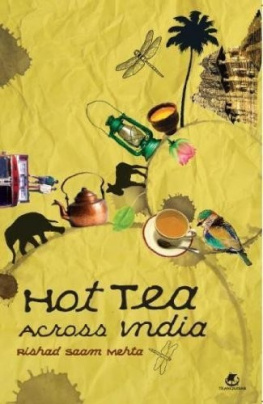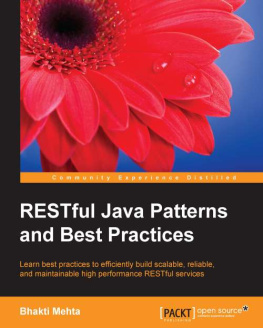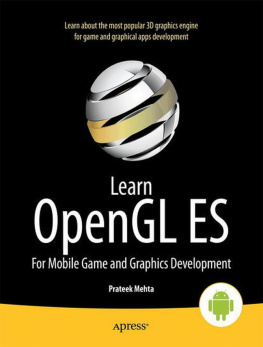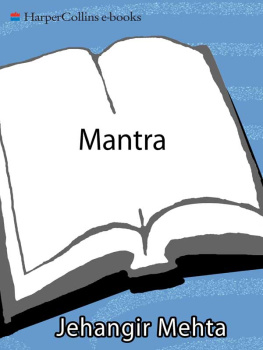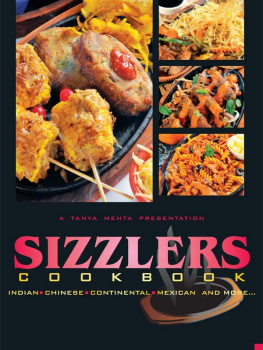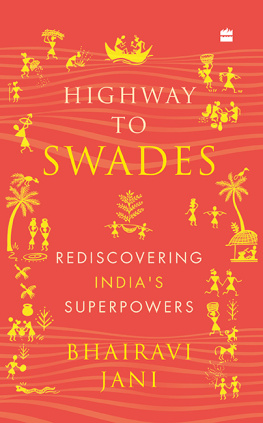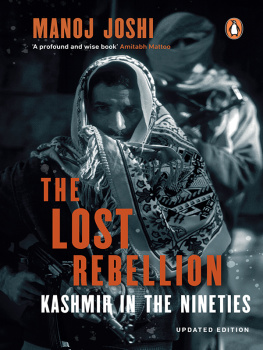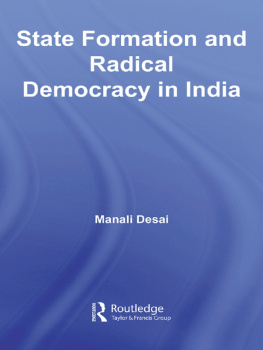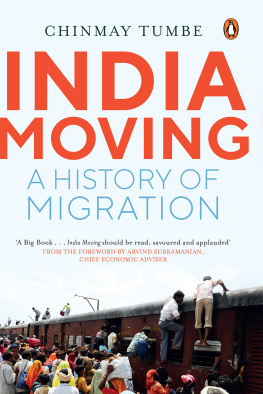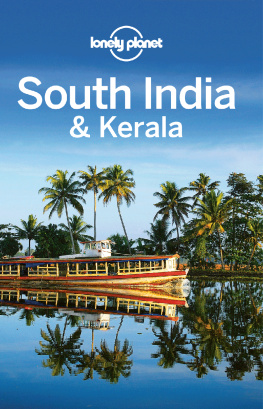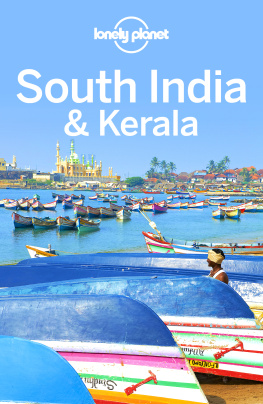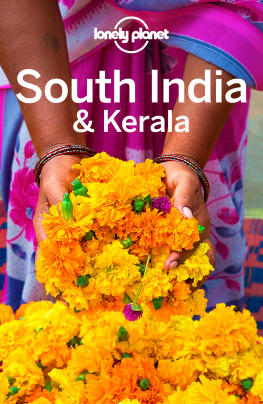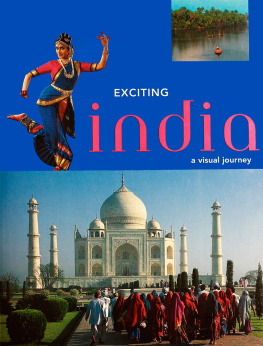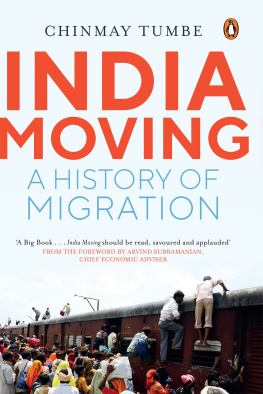
HOT TEA ACROSS INDIA
Rishad Saam Mehta graduated as an electronic engineer from Bombay University and is a travel writer and photographer. He lives in Mumbai and is especially fond of road trips, adventure sports, history and food, all of which tend to feature in his travel stories.
P RAISE FOR H OT T EA A CROSS I NDIA
Hot Tea Across India is an amusing and informative series of long drives, winding detours, and entertaining digressions along the highways of India. Rishad Saam Mehta evokes the unexpected pleasures of the open road, while celebrating Royal Enfi eld motorcycles, Tata trucks, the Indian Railways and other familiar modes of transport. His prose is fuelled by a fi nely-tuned carburettor.
Stephen Alter
Mehtas passion for travel is quite infectious, his enthusiasm very real, and some of his adventures are amusingly larger than life. Told with a generous lashing of humour and a thorough knowledge of the territory
The Hindu
a travel book written with ease, wit and a sense of place and people.
Eunice de Souza, Mumbai Mirror
Th e book is replete with interesting encounters, making it an ideal tea-time read.
Business India
the writing is very good, especially when Mehta describes scenery and breathtaking Himalayan ranges as he is riding past them or setting camp.
Ibnlive.com

TRANQUEBAR PRESS
An imprint of westland ltd
Venkat Towers, 165, P.H. Road, Maduravoyal, Chennai 600 095
No. 38/10 (New No. 5), Raghava Nagar, New Timber Yard Layout, Bangalore 560 026
Survey No. A-9, II Floor, Moula Ali Industrial Area, Moula Ali, Hyderabad 500 040
23/181, Anand Nagar, Nehru Road, Santacruz East, Mumbai 400 055
4322/3, Ansari Road, Daryaganj, New Delhi 110 002
First published in India in TRANQUEBAR by westland ltd 2011
Illustrations by Gynelle Alves
Copyright Rishad Saam Mehta 2011
All rights reserved
10 9 8 7 6 5 4 3 2
ISBN: 978-93-81626-10-8
Typeset in Minion Regular by SRYA, New Delhi
Printed at Shree Maitrey Printech Pvt. Ltd., NOIDA
This book is sold subject to the condition that it shall not by way of trade or otherwise, be lent, resold, hired out, circulated, and no reproduction in any form, in whole or in part (except for brief quotations in critical articles or reviews) may be made without written permission of the publishers.
Contents


I f there is one certainty about roads in India, it is thatno matter where you are or what the hourif you want a cup of tea, youll find a chai ka dukaan within a few kilometres. The tea shop is an integral part of Indian national highways, state highways, minor roads, even rough tracks. From the desolate unsealed roads of Spiti high up in the Himalayas, to the sinuous route to Munnar, a cup of tea is within easy reach.
When I travel, I like to drink tea, or rather, I need to drink tea; sometimes, I even survive just on tea. In fact, my travels in India are intricately linked with tea. A hot cup of well-brewed tea can truly be reviving in a way that a chilled aerated drink cannot. Even while driving through Rajasthan in the blazing desert summer, a khullad of chai in the shade of a tea tapri can refresh the mind and rejuvenate the body.
Hot tea has plenty of avatars across India. It can vary from a steaming hot cup of amber laced with fragrant spices like cardamom and ginger in Gujarat, to a glass of pale greenish liquid with yaks butter floating on top in a monastery in Ladakh. It can be served in a chipped white cup on a railway platform, a little clay pot (the khullad) across Rajasthan and Uttar Pradesh, or the standard cutting glass which is the norm in Mumbai and south India. It might be strained by a delicate muslin cloth or flamboyantly poured from glass to glass to give it a fine froth. Tea shops can vary from flyinfested hovels to a hut surrounded by snow-capped mountains and with a river gurgling merrily behind it.
I dont think I can remember a single journeyand there have been manywhere I havent stopped for a cup of tea. This beverage that epitomises India and is appreciated from Kargil to Kanyakumari often breaks the monotony of long hours on the road and has often led to some very interesting moments. It has started delightful conversations and has also caused digestive consternation. Chai has recharged me in Kashmir and reassured me in Kerala. It has been brewed for me by a former bandit and a simple shepherd. It has chased away the demons in my head and made a frontier man my friend.
A cup of hot tea has been an integral part of every adventure Ive had and every journey Ive made in India.
The Highway Man and a Buffalo
Instead of a Can

T ea stalls are the most lucrative of highway businesses. They will never go out of style and people sometimes run them as part of their retirement plans, as I found out on one of my first travel assignments.
The plan was to hitch a ride from Mumbai to Delhi in a truck and then write an article about the experience. I needed someone to go along with me for the jaunt. Now there are two people who immediately subscribe to my hare-brained travel ideas and at-the-drop-of-a-hat plans, no matter how outrageous or ridiculous they may sound, which is one of the reasons why they are my finest friends. One of them is Shapur, a former colleague, and the other is Chetan, born five days before me and infused with a never-ending enthusiasm to take a break from the mundane. Ive known Chetan for twenty-three years, and hes never shied away from adventure, no matter how ridiculous or harebrained. From scaling a wall to get into a womens hostel when we were in college to jumping off a bridge into a raging river, he has been willing party to the plan.
So there we were, Chetan and I, one early morning, backpacks on our shoulders, trying to flag down trucks at Wadala in Mumbai. About a dozen completely ignored us; twenty or so passed by with the driver or cleaner enthusiastically waving back; one went past with the driver throwing a fistful of coins at us assuming we were homeless hobos. But perseverance paid off and finally, after about ninety minutes of us running through the entire gamut of attention-arresting actions, one truck stopped. The driver, Rathi Lal Khan, probably assumed we wanted to hitch a ride till the next junction, and was put completely on the backfoot when we settled down and declared that wed be tagging along right till the capital. An offer to pay for all their meals during the trip and let them keep the bills secured us seats.
For three days we endured that small cabin, which we shared with the truck driver and the cleaner, Sher Mohammed Akbar. Often, when the smell of diesel and sweat became overpowering, we would escape to the carrier on top of the cab with a bundle of the truckers beedis. On starry nights, Sher Mohammed would join us on top of the cab with his flute and play haunting tunes that would scatter away into the night.
Sher Mohammed was a family man, and so his side of the truck had pictures of his wife and kids, as well as his parents. He was a gentleman, impeccably mannered and warm and courteous. Rathi Lal, on the other hand, was a randy rooster with a roving eye. His side of the cabin was populated with pictures of buxom ladies with bosoms and thighs so considerable that youd need a land measuring tape to assess their girth. Every time we passed through a village or town, his eyes would lock onto any passing village belle like the guiding laser of a heat-seeking missile.
Next page
